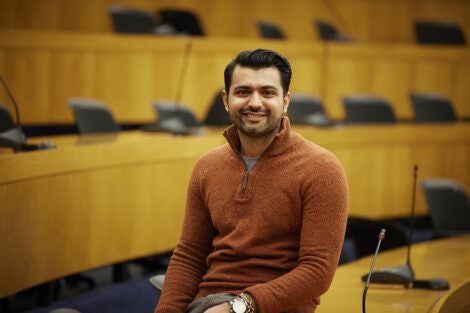Hussain Lalani, SM ’23, named STAT Wunderkind for his efforts to tackle a vexing health issue
January 12, 2023 – There’s a simple truth that Hussain Lalani learned as a medical school student at Duke: Prescription drugs don’t work if you can’t afford them.
Over and over during his medical training, he saw patients who couldn’t afford to pay for their medicines. “And they were getting readmitted to the hospital or having complications, and I thought, ‘Wow, this is ridiculous,’” he said.
Lalani has since made it his mission to find a better way to make vital medicines affordable. As a master’s student in health policy at Harvard T.H. Chan School of Public Health and a general internal medicine fellow at the Program on Regulation, Therapeutics, and Law (PORTAL) at Brigham and Women’s Hospital and Harvard Medical School, he toggles between seeing patients in primary care clinic and investigating the system that governs how they get the medicines they need.
In the summer of 2022, Lalani and colleagues at PORTAL published a research paper in the Annals of Internal Medicine examining how Medicare might save money by adopting the pricing structure used by the drug company startup supported by entrepreneur and Dallas Mavericks owner Mark Cuban. Cuban’s company purchases generic drugs directly from drug manufacturers and sells them directly to consumers with just a 15% markup and $8 in dispensing and shipping fees. Lalani’s study concluded that, based on cost savings for some 80 drugs, Medicare could potentially save $3.3 billion annually. “And that’s just for a small sample of generic drugs,” Lalani said.
For his work, STAT News named him a 2022 STAT Wunderkind, along with some 30 other next-gen “scientific superstars.”
A focus on health equity
Lalani grew up outside Dallas, Texas, to immigrant parents; His father, who is from Pakistan, worked in the dry cleaning business, and his mother, who grew up in Kenya, was a clerk in the county title office. Growing up in a low-income household, he said, “our family struggled to afford groceries and health insurance.” As an undergrad at Duke studying neuroscience and global health, he focused on global health equity, traveling to rural Kenya for two months to study childhood malnutrition. “It really opened my eyes,” he said. While he had experienced poverty in his own family, he noted, “I hadn’t quite lived it that way. I started to get more interested in why these health and social inequities were happening and how we could solve this problem.”
He went back to Kenya during medical school on an eight-month fellowship to understand how the resource-poor country’s effort to boost health by investing in intensive care units was affecting patient survival. That experience led him to realize that in order to address the root causes of disease, he needed to learn more about public health.
He earned a master’s in public health at Johns Hopkins with a focus on epidemiology and biostatistics, before coming to Harvard Chan School for a master’s in science in health policy specifically to investigate prescription drug pricing. He has done some of that work as a fellow at PORTAL, an interdisciplinary research center through which experts in medicine, public health, epidemiology, law, and ethics examine the regulation, use, and reimbursement of therapeutics and medical devices.
Lalani explained that the price a consumer pays for a prescription drug depends on a complicated distribution system in which manufacturers sell to wholesalers, who then sell to more than 70,000 pharmacies nationwide. At each stage there is a markup, with little transparency on what’s involved in the price increases. “We have a very limited understanding of what it actually costs to make most drugs,” Lalani said. He added that insurance companies—which are supposed to negotiate better prices with drugmakers via pharmacy benefit managers—“clearly don’t do a very good job for some drugs.”
Given the prohibitive cost of certain drugs, Lalani was inspired to examine the Mark Cuban Cost Plus Drug Company’s strategy of selling directly to the consumer. “Everything is clear, and there are no hidden fees,” Lalani said. As innovative as it seems, however, the company only provides generic drugs. To truly make an impact on drug affordability, Lalani said, new policies are needed to address transparency and prices of brand-name prescription drugs, as well as other issues such as patent reform.
Lalani is heartened by the prescription drug provision in the recently passed Inflation Reduction Act, which will allow Medicare to negotiate some drug prices and to cap annual out-of-pocket drug spending for Part D enrollees. But he hopes to see these policies expanded in the future to cover more prescription drugs and to help more patients, including those with private insurance. After he earns his Harvard Chan School degree, Lalani hopes to play a more active role in helping to shape prescription drug policy, either from inside or outside government. He’s optimistic that his award from STAT will help to elevate the issue. He said that receiving the award “has been a great opportunity to talk more about why patients are struggling to afford their medicines and what we can do to address that. It also showcases the importance of health policy research in guiding us to move towards a more equitable world.”
Photo: Kent Dayton
